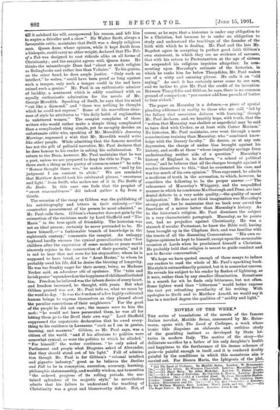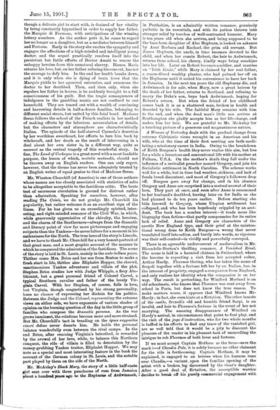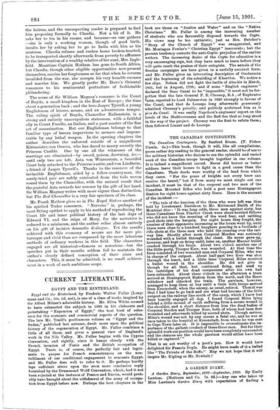NOVELS OF THE WEEK.*
THE series of translations of the novels of the famous Italian novelist, Matilde Servo, announced by Mr. Heine- mann, opens with The Land of Cockayne, a work whose ironic title disguises an elaborate and ruthless study of the gambling instinct as developed by State lot- teries in modern Italy. The motive of the story—the deliberate sacrifice by a father of his only daughter's health and happiness to the furtherance of his insane schemes of gain—is painful enough in itself, and it is rendered doubly painful by the conditions in which this monstrous aim is carried out. For Bianca Maria, the Iphigenia of the plot, • (1.) The Land of Cockayne. By Matilde Serao. London : W. Heinemann. [81—{2.) The Crisis. By Winston Churchill: London i Macmillan and Co. 6s3.) Black Mary. By Allan McAuley. London i T. Fisher Unwire. 8s. — 4.) A Woman of Yesterday. By Caroline A. Mason. London i Hodder and Stoughton. [68.]—(5.) A Panicked Rival. By Jam BloundelleHurtou. London: Cassell and Co. [43s.]]- —(13.) Claudia Pole. By Carleton 3/awe. London: Hutchinson and Co. )Gs.]—(7.) The Rod elianceitar: a Romance. By Sir William Matjnny, Bart. Loondon: War!, Lock, and Co. [6s.]—(8.) The Royal Sisters. By Frank Mathew. London i John L mg. 1-69.::
though a delicate girl to start with, is drained of her vitality by being constantly hypnotised in order to supply her father, the Marquis di Formosa, with anticipations of the winning lottery numbers. As the author puts it, he came to regard her no longer as a daughter, but as a mediator between himself and Fortune. Early in the story she excites the sympathy and engages the affections of a high-minded and intelligent young doctor, and the sequel practically resolves itself into the persistent but futile efforts of Doctor Amati to rescue the unhappy heroine from this unnatural slavery. Bianca Maria returns his love, but, on her father refusing his consent, has not the courage to defy him. In the end her health breaks down, and it is only when she is dying of brain fever that the Marquis yields to her agonised entreaties, and summons the doctor to her deathbed. Then, and then only, when she repulses her father in horror, is he suddenly brought to a full consciousness of his guilt. But the tragic consequences of indulgence in the gambling mania are not confined to one household. They are traced out with a wealth of convincing and harrowing details in half-a-dozen families, belonging to different social strata, but united by this fatal bond. Madame Serao follows the school of the French realists in her method of making effects by the laborious accumulation of details, but the characters and atmosphere are characteristically Italian. The episode of the half-starved Carmela's desertion by her worthless sweetheart, her efforts to lure him back by witchcraft, and her death as the result of intervening in a duel about her own sister is, in a different way, quite as naurant as the central tragedy of this wonderful story. In fine, The Land of Cockayne is a great novel with a most laudable purpose, the lesson of which, mutatis mutandis, should not be thrown away on English readers. One can only regret, however, that the theme has never been adequately treated by an English writer of equal genius to that of Madame Serao.
Mr. Winston Churchill (of America) is one of those authors whose names are too closely associated with statistics of sales to be altogether acceptable to the fastidious critic. The brute teat of enormous circulation is ground for distrust rather than admiration. Speaking for ourselves, however, after reading The Crisis, we do not grudge Mr. Churchill his popularity, but rather welcome it as an excellent sign of the times. For he has given us an exceedingly spirited, inter- esting, and right-minded romance of the Civil War, in which, while generously appreciative of the chivalry, the heroism, and the charm of the Southerners—always from the dramatic and literary point of view far more picturesque and engaging subjects than the Yankees—he never falters for a moment in his enthusiasm for the North. The true hero of the story is Lincoln, and we have to thank Mr. Churchill for a very honest portrait of that great man, and a most graphic account of the manner in which he conquered the admiration of the fastidious. The scene of the story is laid in St. Louis, mainly in the ante-bellum years. Thither come Mrs. Brice and her son from Boston to make a fresh start in life, thither also Eliphalet Hopper, the shrewd, sanctimonious Yankee adventurer and villain of the plot. Stephen Brice studies law with Judge Whipple, a fiery Abo- litionist, but a great personal friend of Colonel Carvel, a typical Southern cavalier and father of the lovely Vir- ginia CarveL With her Stephen, of course, falls in love, but Virginia, though magnetised by his strong personality, loses no chance of expressing her disdain for his politics. Between the Judge and the Colonel, representing the extreme views on either side, we have exponents of various shades of opinion on the burning question of the day in the little group of families who compose the dramatis persona. As the war grows imminent, the relations become more and more strained. But Mr. Churchill's tact in treading on the ignes suppositos cineri doles° never deserts him. He holds the personal balance wonderfully even between the rival camps. In the end Brice, after rescuing Virginia's betrothed, is rewarded by the avowal of her love, while, to balance this Northern conquest, the role of villain is filled to detestation by the money-grubbing Yankee traitor, Eliphalet Hopper. We may note as a special and most interesting feature in the book the account of the German colony in St. Louis, and the notable part played by them on the aide of the North.
Mr. McAulay's Black Mary, the story of a little half-caste girl sent over with three puncheons of rum from Jamaica i►bout a hundred years ago to the Hepburzus of Ardwinnoch, in Perthshire, is an admirably written romance, genuinely pathetic in its essentials, and with its pathos thrown into stronger relief by touches of well-contrasted humour. Mary is ten years old when she arrives, and being supposed to be the base-born daughter of Alec Hepburn, is looked on askance by Aunt Barbara and Rachael, the grim old servant. But James Hepburn, the uncle, in time becomes devoted to the child, and when her cousin Robert, the heir to Ardwinnoch,
returns from school, his cheery, kindly ways bring sunshine into her life. Later on Robert becomes a soldier, and marries an " Irish hizzie," while Mary is claimed by her real father, a coarse-fibred wealthy planter, who had palmed her off on the Hepburns until it suited his convenience to have her back in Jamaica. In the next ten years the old Hepburns die, and Ardwinnoch is for sale, when Mary, now a great heiress by the death of her father, returns to Scotland, and refusing to marry the Duke's son, buys back Ardwinnooh, hoping for Robert's return. But when the friend of her childhood comes back it is as a shattered man, broken in health and deserted by his wife. The faithful Mary remains with him to the end, and when the dead man's little son arrives at Southampton she gladly accepts him as her life-charge, and makes him her heir. We are grateful to Mr. McAulay for a touching picture of a generous and magnanimous nature. A Woman of Yesterday deals with the gradual change from extreme Calvinistic views wrought in an American and his wife, who at the time of their first meeting are both medi- tating a missionary career in India. Owing to the breakdown of Keith Burgess's health they never realise this aim, but live fora while a luxurious and conventional life with his mother at Fulham, U.S.A. On the mother's death they fall under the influence of a revivalist preacher named Gregory, and join his Socialistic settlement in North Carolina. The scheme works well for a while, but in time bad weather, sickness, and lack of funds breed discontent, and most of Gregory's followers drop off. Burgess goes away for change, and in his absence Gregory and Anne are surprised into a mutual avowal of their love. They part at once, and soon after Anne is summoned to her husband's deathbed, leaving later on for India as she had planned to do ten. years earlier. Before starting she bids farewell to Gregory, whose Utopian settlement has collapsed, and who has been hopelessly crippled by an acci- dent. The book has a sombre interest—it reads more like biography than fiction—that partly compensates for its entire lack of relief. Anne and Gregory are characters of the ascetic New England type, and their grief at the uninten- tional wrong done to Keith Burgess—a wrong that never translated itself into action, and barely into words, so rigorous was their self-control—is vividly and powerfully conveyed. There is an agreeable undercurrent of mediervalism in Mr. Bloundelle-Burton's thrilling romance, A Vanished Rival. The scene is laid in a haunted chLteau in Switzerland, where the heroine is expecting a visit from her accepted suitor, Arthur Hardy. Florence Goring, who has taken the name of Serpoli together with a fortune left her by an Italian, has, in the interest of propriety, engaged a companion from England, and only realises her identity when the companion is on her way. The result is perturbing, for Winifred Morland is an old schoolmate, who knows that Florence was sent away from school in Paris, but does not know the true reason. To make matters worse, it appears that Winifred knows Mr- Hardy ; in fact, she even hints at a flirtation. The other inmate of the castle, Serpoli's old and humble friend Sarpi, is an invalid, and heir to Florence's fortune in the event of her not marrying. The amazing disappearance of Winifred on Hardy'a arrival, in circumstances that point to foul play, and the visit of the jugs d'instruction, who for two whole months is baffled in his efforts to find any trace of the vanished girl, are so well told that it would be a pity to discount the pleasure of the reader in his pleasant task of unravelling the intrigue to rob Florence of both lover and fortune.
If we must accept Captain Hotham as the hero—save the mark !—of Claudia Pole, it is solely because no other claimant for the role is forthcoming. Captain Hotham, it may be explained, is engaged to an heiress when his hansom runs over Claudia,—a variant .upon the familiar opening of the artist with a broken. .leg diecovered by the vicar's daughter. After a good, deal of, flirtation, the susceptible warrior decides to break off his purely commercial engagement with the heiress, and the unsuspecting reader is prepared to find him proposing formally to Claudia. Not a bit of it. He asks her to tea in his roonis, and because—so one gathers —she is only a working woman, though of good birth, insults. her by asking her to go to India with him as his mistress. Claudia refuses and rushes home broken-hearted, to be transported shortly afterwards from poverty to affluence by the intervention of a wealthy relative of her aunt, Mrs. Ingle- field. Meantime Captain Hotham has gone to South Africa, but Claudia, though other eligible opportunities now present themselves, carries her forgiveness so far that when he returns invalided from the war, she accepts his very humble excuses and marries him. We greatly prefer Mr. Dawe's Oriental romances to his sentimental portraiture of fashionable philandering.
The scene of Sir William Magnay's romance is the Court of Buyda, a small kingdom in the East of Europe ; the time about a generation back ; and the hero Jasper Tyrrell, a young Englishman of leisure, means, and an adventurous temper. The ruling spirit of Buyda, Chancellor Rallenstein, is a strong and entirely unscrupulous statesman, with a faithful ally in Count Furello, an Italian, and a past-master of the fine art, of assassination. But our Englishman belongs to that familiar type of heroes impervious to menace and impene- trable by any lethal weapon. In the opening chapters the author describes the enforced suicide of a magnificent Rittmeister, von Orsova, who has dared to marry secretly the Princess Casilde. One by one all the witnesses of the marriage are eliminated—by sword, poison, drowning, 8c.— until only two are left, Asta von Winterstein, a beautiful Court lady attached to the Princess's suite, and von Lindheim, a friend of Jasper Tyrrell's. Thanks to the resource of the invincible Englishman, aided by a fellow-countryman, the sorely-tried pair are safely extricated from the toils woven round them by the Chancellor, with the natural result that the grateful Asta rewards her rescuer by the gift of her band. Sir William Magnay writes with more vigour than distinction, but The Red Chancellor is a very fair specimen of its class.
Mr. Frank Mathew gives us in The Royal Sisters another of his spirited Tudor romances. " Nervous" is, perhaps, the most fitting epithet to apply to his method of reproducing the Court life and inner political history of the last days of Edward VI. and the reign of Mary, for the narrative is reduced to a minimum, and the author relies almost entirely on his gift of incisive dramatic dialogue. Yet the results achieved with this economy of means are fur more pic- turesque and vivid than are compassed by the more laborious methods of ordinary workers in this field. The characters engaged are all historical—famous or notorious—but the speeches put in their mouths seldom fail to maintain the author's clearly defined conception of their aims and characters. This, it must be admitted, is no small achieve- ment in a work of such ambitious scope.












































 Previous page
Previous page